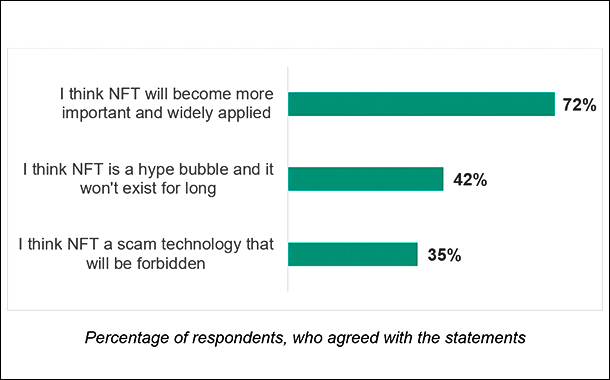Kaspersky has conducted research to investigate what people think about digital assets tokenized via blockchain. According to the results of the survey, 82% of people in the UAE have heard of Non-Fungible Tokens. At the same time, 21% of those who have heard of NFTs, know nothing about them. The danger is that lack of awareness increases the likelihood coming across financial and cyber risks in this sphere.
Around 67% who have heard of NFTs suppose that this technology is used to speculate in the digital sphere and 35% share the opinion that NFT is a technology to scam people online. However, 77% of respondents think it can offer a new progressive way of trading digital assets and 72% believe that it can ensure uniqueness of digital assets and attribute intellectual property.
When it comes to the future of NFT, 72% of people in the UAE think it will become more important and widely applied, 42% suppose that it is a hype bubble.
Graph for the UAE

“Today NFTs draws much attention, but people may face fraud in this market. We ask users to be careful when it comes to any news or speculations on this topic. When new technology or trend appears, it is very important to get as much as possible information, analyze all the risks including financial ones and remember that hot topics have always held particular appeal for cybercriminals”, comments Emad Haffar, Head of Technical Experts at Kaspersky.
NFT owners as well as other Internet users may come across different cyber threats such as phishing, malware attacks and online scam. To avoid falling victim to an NFT scam, Kaspersky recommends:
- Observe essential cybersecurity practices, such as using strong passwords and two-factor authentication, having trusted security solution installed, like .
- While storing your crypto on exchanges is convenient, it is safer to store it in a cold wallet – i.e., a hardware device where keys and assets are stored offline.
- Before investing significant sums in NFTs, carry out an initial transaction with a small amount of money first to make sure everything is working as it should.
- Ignore spam, such as DMs or odd NFTs that strangers send to your wallet, which can have malicious contracts attached.
- Before you buy NFTs, research how to keep both your information and cryptocurrency safe. Read online guides, reviews and testimonials to understand the market and the risks involved.
The survey was conducted by Opinium on behalf of Kaspersky in 2022 in Eurasian countries among more than 2,000 people.

















